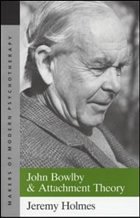Nicht lieferbar

John Bowlby and Attachment Theory
Versandkostenfrei!
Nicht lieferbar
Weitere Ausgaben:
Table of contents:Part I: Origins Chapter. Introduction. Biographical. Maternal Deprivation. Part II: Attachment Theory. Attachment, Anxiety, Internal Working Models. Loss, Anger and Grief. Attachment Theory and Personality Development: the Research Evidence. Part III: Implications. Bowlby and the Inner World: Attachment Theory and Psychoanalysis. Attachment Theory and the Practice of Psychotherapy. Attachment Theory and Psychiatric Disorder. Attachment Theory and Society. EpilogueAttachment Theory is one of the most important theoretical developments in psychoanalysis to have emerged in the p...
Table of contents:
Part I: Origins Chapter. Introduction. Biographical. Maternal Deprivation. Part II: Attachment Theory. Attachment, Anxiety, Internal Working Models. Loss, Anger and Grief. Attachment Theory and Personality Development: the Research Evidence. Part III: Implications. Bowlby and the Inner World: Attachment Theory and Psychoanalysis. Attachment Theory and the Practice of Psychotherapy. Attachment Theory and Psychiatric Disorder. Attachment Theory and Society. Epilogue
Attachment Theory is one of the most important theoretical developments in psychoanalysis to have emerged in the past half-century. It combines the rigorous scientific empiricism of ethology with the subjective insights of psychoanalysis, and has had an enormous impact in the fields of child development, socila work, psychology, and psychiatry.
This is the first known book to appear which brings together John Bowlby and post-Bowlbian research and shows how the findings of Attachment Theory can inform the practice of psychotherapy. It also provides fascinating insights into the history of the psychoanalytic movement and looks at the ways in which Attachment Theory can help in the understanding of society and its problems.
This book brings together for the first time the work of John Bowlby and post-Bowlbian research. As well as providing insights into the history of the psychoanalytic movement it shows how Attachment Theory can inform the practice of psychotherapy.
Part I: Origins Chapter. Introduction. Biographical. Maternal Deprivation. Part II: Attachment Theory. Attachment, Anxiety, Internal Working Models. Loss, Anger and Grief. Attachment Theory and Personality Development: the Research Evidence. Part III: Implications. Bowlby and the Inner World: Attachment Theory and Psychoanalysis. Attachment Theory and the Practice of Psychotherapy. Attachment Theory and Psychiatric Disorder. Attachment Theory and Society. Epilogue
Attachment Theory is one of the most important theoretical developments in psychoanalysis to have emerged in the past half-century. It combines the rigorous scientific empiricism of ethology with the subjective insights of psychoanalysis, and has had an enormous impact in the fields of child development, socila work, psychology, and psychiatry.
This is the first known book to appear which brings together John Bowlby and post-Bowlbian research and shows how the findings of Attachment Theory can inform the practice of psychotherapy. It also provides fascinating insights into the history of the psychoanalytic movement and looks at the ways in which Attachment Theory can help in the understanding of society and its problems.
This book brings together for the first time the work of John Bowlby and post-Bowlbian research. As well as providing insights into the history of the psychoanalytic movement it shows how Attachment Theory can inform the practice of psychotherapy.




